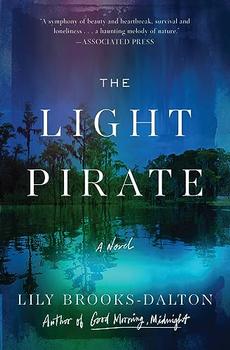Reading Guide Questions

Please be aware that this discussion guide will contain spoilers!
- The English word "hurricane" is adopted from the Spanish word huracán, which is derived from Juracán, the name the Taíno, the Indigenous people of the Caribbean, bestowed upon their God of chaos and destruction. Hurricane Wanda, however, is depicted as a powerful yet impersonal force: "The hurricane takes what yields. Nothing more; nothing less." How do these two interpretations affect your personal feelings about natural disasters—and their consequences?
- The novel unfolds in four parts: power, water, light, and time. How does The Light Pirate's unique structure mirror Wanda's journey from childhood to adulthood while also speaking to the changes taking hold of the natural world?
- One major theme of The Light Pirate is humanity's turbulent relationship with nature and climate change. Frida is paralyzed by the enormity of a collective decline she sees occurring all over the world. Kirby is determined to ignore it, to focus only on problems with immediate solutions. Phyllis has given up on civilization and is instead preparing for the worst. How did these different coping mechanisms make you think about your own response to the challenges humanity faces?
- In the face of the world's problems, Kirby and Frida grapple with the idea of bringing a new child into the world. Phyllis is intentional about not wanting to become a mother. Today, some couples are choosing not to have children, in the name of environmental responsibility. Where do you fall in this debate?
- While the second part of The Light Pirate moves readers further into a speculative future, the story begins in the wake of another hurricane, Poppy, which followed the real-life Hurricane Maria, the Category 5 storm that hit Puerto Rico in 2017: "The government had left [Puerto Rico] to drown and sent men like [Kirby] to pretend they'd done all they could." How did this passage—about Kirby confronting future instability, and the U.S. government's failure to support Puerto Rico after these disasters (one real, one fictional)—make you feel? How did it make you think about the hardships Puerto Rico continues to face, years after Maria?
- When Wanda is a child, the world—as we currently know it—has irrevocably changed. "The Edge" is a creeping new reality, swallowing coastal areas inch by oceanic inch, while hurricanes chip away at existing infrastructure and weaken the electrical grid. As a result, Floridians are driven to seek better living conditions elsewhere. And while the book's gaze is focused on the Sunshine State, we get the sense that other places are facing their own dire challenges. In your own life, how do you think about—and prepare for—changing landscapes and weather? How did the author's depiction of events make you think about our planet's future?
- When confronted "with the rage of a man left behind by civilization" outside what used to be a post office, it occurs to Phyllis that teaching Wanda how to survive the people who stayed in Rudder is paramount. As the novel progresses, we see examples of both the danger and the necessity other people pose to Wanda. What were your thoughts on this conundrum? How would you navigate wariness and trust in such a brutal world?
- The twins (Corey and Brie/Bird Dog) are two very different kinds of people. How do you reconcile their shared childhood with the adults they grew up to be?
- The italicized interludes that accompanied each section of the book—power, water, light, and time—are focused on different elements. What did you take away from these passages? Did they change the way you thought about the landscape these characters inhabited?
- Phyllis reflected that the world "would have to collapse in order for a new kind of society to be built; or, more likely, for some other epoch to have its day. Humanity was an ecological disaster... . Evolution could do so much better. Someday soon, it would." In this scene, did you agree or disagree with Phyllis's assessment? Why or why not?
- Discuss the changing relationship between Wanda and Bird Dog/Brie from childhood to adulthood to old age.
- At the end of the novel, the author presents an epilogue set during Wanda's old age. What did you think of Wanda and Bird Dog's treehouse community on the water? What did you take away from this glimpse of Wanda's future?
Download the Book Club Kit
Unless otherwise stated, this discussion guide is reprinted with the permission of Grand Central Publishing.
Any page references refer to a USA edition of the book, usually the trade paperback version, and may vary in other editions.

 Book Reviewed by:
Book Reviewed by:





